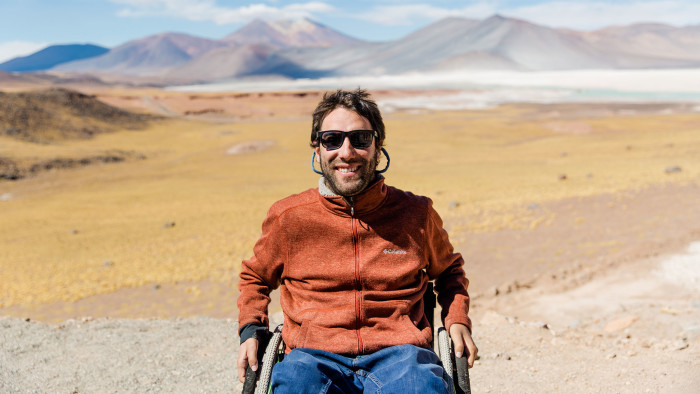Disabled adventure travel entrepreneur’s MBA journey

Roula Khalaf, Editor of the FT, selects her favourite stories in this weekly newsletter.
The proximity of Berkeley’s Haas School of Business to Silicon Valley makes it a draw for would-be entrepreneurs deciding where to study for an MBA. But for Alvaro Silberstein there was a more compelling reason to chose Haas.
Having used a wheelchair since suffering a spinal injury in a car accident at the age of 18, he was drawn to the school because of its history concerning students with disabilities. Berkeley campus protests in the 1960s and ’70s by disabled student activists such as Ed Davis paved the way for vital legislation including the Americans with Disabilities (ADA) Act.
“To study my MBA where that movement for the inclusion of people with disabilities took place was very inspiring. It made me realise I could become like them and make an impact on inclusion and accessibility through business,” he says.
His start-up, Wheel the World, organises travel experiences for people with disabilities, from visiting Machu Picchu to swimming with sharks. Founded in 2017, the year he graduated, its destinations include Latin America, Africa, Europe and the US, with an emphasis on outdoor adventure.
“Coming to Haas from another country, Chile, with a severe disability and living independently without my family for the first time, it helped me a lot to be in an environment that was professionally competitive, but human at the same time, with strong values around taking care of each other,” he says.
With volunteers who can help bring students to class, or take notes if necessary, Haas caters for people with different disabilities. “It has technologies and resources that, if you have a hearing or a visual or a physical impairment for example, allow you to study as anyone else,” Silberstein says.
Most business schools are designed to be accessible to disabled students, yet Silberstein believes there is room for improvement when taking students off-campus. External trips, company visits and networking events are not always inclusive for people with disabilities, he says.
“I was the only person with a disability in my class,” he adds. “Maybe more grants could be given to incentivise high-quality MBA candidates with disabilities to go to business school, because disability is also about diversity.”
Elite business schools perpetuate a campus climate of upbeat positivity that could be intimidating for some. However, a growing number of schools take disabilities into account when reviewing GMAT entry test scores and university grades.
For example, a student who declares a disability at Cambridge Judge Business School in the UK is introduced to its Disability Resource Centre, which develops a plan to meet the student’s needs. This might be centred on physical equipment such as customised furniture, or could involve working with tutors on the student’s learning needs. At other schools, such as the University of Virginia’s Darden School of Business, counsellors are provided in, or close to residence halls, to assist students with mental health issues.
Not all MBA students are ready to declare a need. “We’re still in a society where students and people in general don’t want to talk about their disabilities, 80 per cent of which are non-visible,” says Marcelle Laliberté, director of student affairs at HEC Paris. “So my target right now is to create the environment where they feel safe to talk about it and have difficult conversations, for example around mental health. Do they think it’s taboo to go see a counsellor? What repercussions might it have on their career?”
To stimulate such conversations, HEC holds an annual disability awareness day and hosts events to raise awareness of disorders such as dyslexia, dysphasia and dyscalculia, which respectively affect reading and writing, speech and comprehension, and mathematical understanding. It also offers assistance dogs to help staff and students with physical, neurological or mental health needs.
“Diversity, including neurodiversity, enriches and helps us find innovative and new solutions in the business world,” says Laliberté. “It’s our obligation in business schools to create the environment where students can learn from the different attributes and diversity of our society.”
Javier Quintanilla, an associate dean at Iese Business School in Barcelona, is profoundly deaf and has two cochlear implants. He says, “Business schools as a whole are generally now much more sensitive, willing and proactive about meeting the diverse needs of students but also faculty and employees with a range of disabilities.”
Iese has a partnership with Spanish charity Once Foundation to provide scholarships to students with disabilities and expand the promotion and integration of staff with disabilities. “But until there is the seamless social integration of people with disabilities in education and the wider workplace, the business school sector cannot rest on its laurels,” Quintanilla says.
Comments